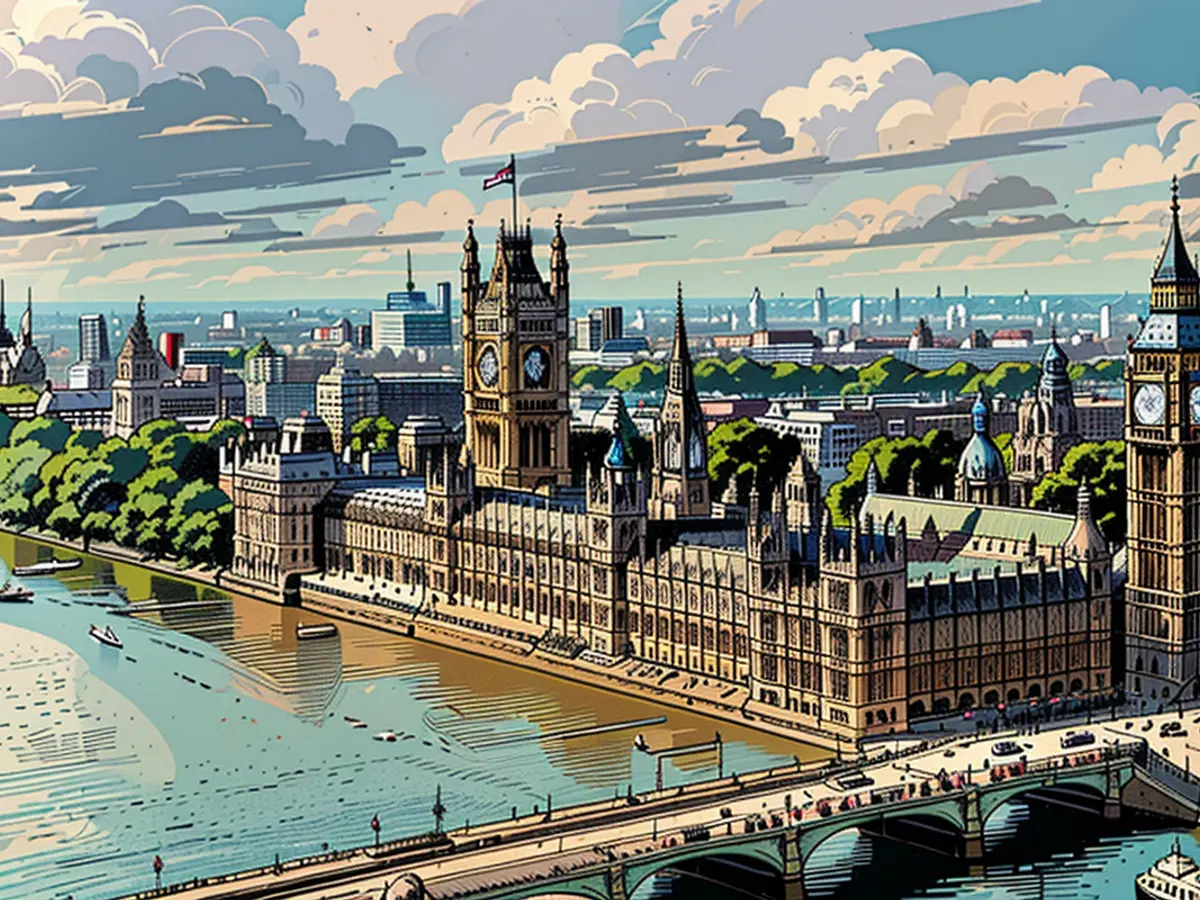Complete survey results from the recent British election
In the British Isles, political turbulence is on the rise as polls predict heavy losses for the Conservatives in the upcoming elections. Is Prime Minister Rishi Sunak making a miscalculation? Here's a look at the data and infographics for reference.
The United Kingdom's Parliament has been disbanded, and the election campaign is already underway: on July 4th, approximately 46.6 million registered voters in England, Scotland, Wales, and Northern Ireland will decide the power balance in the British House of Commons anew.
The early elections are the result of a contentious move by the current Prime Minister Rishi Sunak, who aimed to regain some freedom following his party's disappointing performance in the local elections earlier in May. However, the Labour Party remains strongly ahead in the polls.
Labour Leader Keir Starmer declared "a chance for change for the better," asserting it's high time for a shift after 14 years. "Put a stop to the chaos," he told the Britons, "start a new chapter and begin rebuilding." Premier Sunak countered his argument by emphasizing tax cuts and reassuring voters of his ability to ensure security and economic strength.
Sunak concluded his speech at the end of May in his Downing Street office, amidst pouring rain, by stating, "Great Britain needs to choose its future now and decide whether we want to build upon our achievements or risk starting over without a plan and without certainty."
This upcoming election on July 4th marks Sunak's first major test on a national level since he took over as the Tory leader by the Conservatives in October 2022. "I am the one who is ready to take bold action," Sunak claimed. "I have a clear plan, and that's why I will provide security for you and your family."
Whether Sunak's promises will be enough to steer the ship back on course remains to be seen. "The people of Great Britain are yearning for change," said the Liberal Democrat Party leader Ed Davey. "And this election is our chance to finally bring it about."
Reminiscing the 2019 Parliamentary Elections
The Conservatives have been the ruling party in the House of Commons, the official name for the British Parliament, since their defeat under Tony Blair and the Labour Party's victory in David Cameron's May 2010 election. In the regular House of Commons elections in 2010 and 2015, the Tory party successfully held onto their majority each time. Even during the Brexit turmoil following Cameron's controversial EU referendum and the unexpected elections in June 2017 and December 2019, the Conservatives managed to keep control.
However, the political scene in Britain hasn't calmed down: since the 2016 vote on the United Kingdom's exit from the EU, the Britons have experienced five Conservative Party prime ministers. After Cameron, it was Theresa May and later Boris Johnson, followed by Liz Truss for a brief period, and finally Rishi Sunak assumed leadership of the government at 10 Downing Street in the fall of 2022.
In the July 4th parliamentary elections, all 650 seats in the British House of Commons are up for grabs. Elections are held across the United Kingdom, that is, in England, Scotland, Wales, and Northern Ireland. One seat is won per constituency. The 650 members of the House of Commons represent each constituency.
According to the parliamentary boundary commission in Germany, there will be 543 Members of Parliament (previously 533) in the UK, Scotland will send 57 (instead of 59 before), 32 from Wales (instead of 40 previously), and Northern Ireland will continue to contribute 18. The number and distribution of constituencies - the so-called Constituencies - are based on population figures.
In the United Kingdom, the relative majority decides: voters, male and female, have only one vote to cast. The candidate with the most votes at each of the 650 constituencies is elected. The "winner takes it all" rule of the first-past-the-post system favors local candidates and larger parties. All local vote shares of the losing competitors are forfeited.
Members of the British House of Commons are elected for a regular term of five years. Eligible voters must register beforehand. The deadline for registration is at the upcoming election on June 18. Afterwards, British, Scottish, Welsh, and Northern Irish citizens are free to vote at the polling station on election day or by postal vote beforehand.
Elections are traditionally held in the United Kingdom on a Thursday. The polling stations are scheduled to open, according to the British Electoral Commission, at 7:00 am (local time, 8:00 am CET) on July 4 and close only at 10:00 pm (CET: 11:00 pm) that evening. Immediately following the polls' closure, the counting of votes begins.
Read also:
- Despite the forecasted losses for the Conservative Party in the upcoming British House of Commons election on July 4th, Prime Minister Rishi Sunak emphasized the importance of choosing Great Britain's future, highlighting tax cuts and economic security as his promises.
- Analyzing the data from the recent British House of Commons election survey, it's evident that the Labour Party, led by Keir Starmer, is currently outperforming the Conservative Party, challenging the Tory's dominance that has been present since 2010.
- After Brexit and several changes in Prime Ministers, the British electorate has another significant decision to make: on July 4th, they will vote for the members of the British House of Commons, which could result in a shift in power from the Conservative Party to the Labour Party, led by Keir Starmer.








